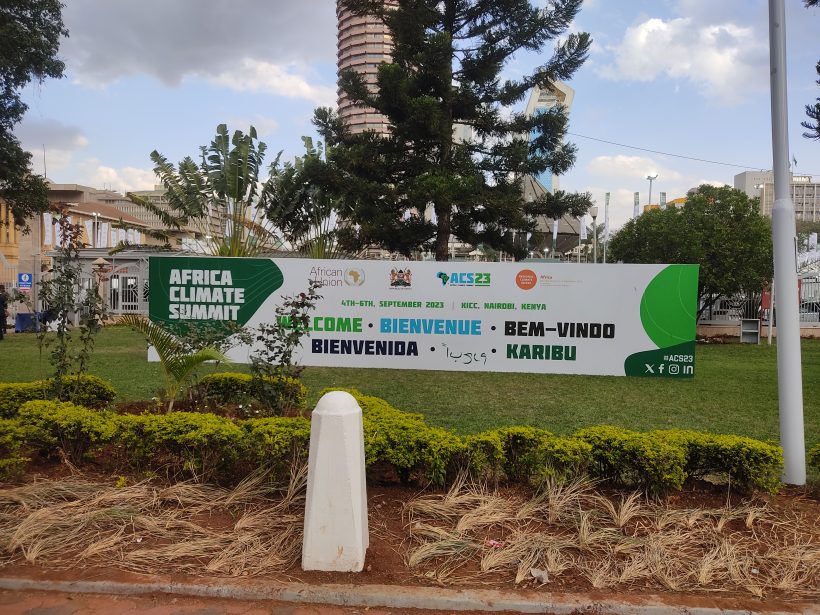
The recently concluded Africa Climate Summit (ACS 2023) held in Nairobi, Kenya, highlighted the need for increased investments in Climate Finance Solutions for Africa and the World.
Beyond climate finance solutions, there is a critical need to pay attention to the adaptation solutions produced and promoted among African smallholders.
The last two Conference of Parties (COP 26 & 27) of the United Nations Framework Convention on Climate Change (UNFCC) in Glasgow and Sharm el-Sheikh, respectively, focused on climate finance and implementation, especially the provision of financial support to the Global South to enhance adaptation actions.
However, socio-economic and cultural factors, including gender, create variability in the impacts experienced by different social groups. Women and girls are more vulnerable to the impacts of climate change owing to existing gender inequalities that create disparities in information access, mobility, decision-making, and access to resources and training.
Speaking at a presummit Africa Science Symposium by the Climate for Development in Africa, Dr. Calvince Ouko, a 2021 One Planet Laureate Candidate and an Environment and Climate Change researcher at the Co-operative University of Kenya delivered a presentation on the “role of cooperatives in gender-responsive solutions for climate action in Africa.”
The symposium explored areas of intervention by stakeholders in climate action on adaptation and resilience to climate risks in the continent.
“With women accounting for more than 50% of representation in cooperatives, the community organizations can be leveraged to promote gender inclusion in adaptive climate resilience building, with most institutions operating in the agricultural sector.” – Dr. Ouko.
Discussions at the summit saw African governments urged to scale up investment to support the transformation to a more efficient, inclusive, resilient, and sustainable agrifood system. Abebe Haile-Gabriel, Food and Agriculture Organization’s Assistant Director-General and Regional Representative for Africa said at the ACS 2023 that agrifood systems have the potential to be solutions to the climate crisis.
Dr. Adade Portia, a 2022 AWARD Policy Fellow, shared the need for evidence-based and inclusive climate action, particularly focusing on vulnerable populations and regions in Africa. Dr. Portia spoke at a side event hosted by AGNES Africa.
Speaking to KTN News on climate and urban sustainability, Molly Akello, a 2021 One Planet Laureate Candidate, emphasized the urgent need to scale up policies geared towards employing cleaner technologies to achieve efficient and sustainable solutions across various industries. Akello emphasized that this approach will have a socio-economic trickle-down effect in other productive sectors.
While the Summit marshaled commendable commitments toward climate financing solutions, there were also notable commitments toward solutions to strengthen Africa’s food systems in the face of a changing climate:
For instance, the Bezos Earth Fund committed $22.8 Million to support women-led activities across Africa. Dr. Andrew Steer, President and CEO of the Bezos Earth Fund, pledged to institute a facility through the AFR100 aimed at the restoration of 600,000 hectares of degraded land in the Greater Rift Valley, home to Kenya’s water towers and a breadbasket for the region, and the Lake Kivu and Rusizi River Basin, part of the second-largest rainforest in the world and home to five million people.
Additionally, the United States announced key investments in food security, with John Kerry, United States Special Presidential Envoy for Climate, announcing $30 Million to Support Initiatives under the President’s Emergency Plan for Adaptation and Resilience (PREPARE) in Africa. This additional $30 million builds on a $100 million announcement made in July 2023 to support climate-resilient food security through the Vision for Adapted Crops and Soils (VACS), which seeks to boost agricultural productivity and nutrition by developing diverse, climate-resilient crop varieties and building healthy soils, with a specific initial focus on Africa.
The African Development Bank President, Akinwumi A. Adesina, also outlined the Bank’s commitment to fast-tracking the mobilization of $25 billion by 2025 to accelerate adaptation action in Africa through interventions in four priority areas/pillars.
Among the key programmatic interventions is the Bank’s initiative on the development of Climate-Smart Digital Technologies for Agriculture and Food Security, which aims to scale access to climate-smart digital technologies for at least 30 million farmers in Africa, supporting food security in 26 African countries and reducing malnutrition for at least 10 million people.
Her Excellency Mariam Bint Mohammed Almheiri, the UAE Minister of Climate Change and Environment and COP28 Food Systems Lead urged African governments to demonstrate leadership by signing the first-ever Leaders Declaration on Food Systems, Agriculture, and Climate Action, in the build-up to COP 28, which she launched in July at the 2023 UN Food Systems Stocktaking Moment in Rome.
